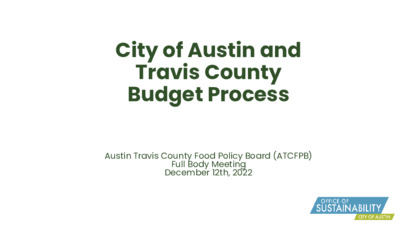City of Austin and Travis County Budget Process Overview - Dec 2022 — original pdf
Backup

City of Austin and Travis County Budget Process Austin Travis County Food Policy Board (ATCFPB) Full Body Meeting December 12th, 2022 Overview of City of Austin Budget Process Proposed Budget Service Delivery Budget Development Procurement & Staffing Budget Approval Budget Process • Department proposals • Board and Commission recommendations • Audit recommendations • Items from Council (IFCs) • SD23 Budget Development — Equity first approach starting in FY 2016 Procurement Cycle Department Identified Need Solicitation Council Approval Submittal and Recommendation Process Purchase/Notice to Proceed Budget Timeline Community Input Meeting Budget readings and tax rate hearings Policy Input Forecasting and Budget Development Council Deliberation & Adoption January January February February March March April April May May June June July July August August September September October October Board and Commissions Council Town Halls Community Input Meetings City Manager’s Proposed Budget published Set max tax rate/Community Input February (start) Budget Guidelines set Budget Cycle (Feb – Sept) Budget meetings with Depts. June September (end) TCCC Budget Markup and Budget Adoption August Select Budget Hearings at TCCC March Budget Kickoff Dpts. Budget Budget requests due (internal and Submiss- external) ions Due April July Preliminary Budget published by PBO PBO review budget submissions May Travis County Budget Cycle Definitions: PBO = Travis County Planning and Budget Office TCCC = Travis County Commissioners Court Note: Visualization is a general reference. Specific dates/months for each phase may vary year-to-year. Key Dates for FY 2022 Budget Calendar Note: Dates for FY2023 budget process are still TBD by the Travis County Budget Office. General steps and process flow are typically similar year to year. The 2022 dates below are shared for reference only. 2022 Date March 31 April 2 April 12 April 12 April 26 May 27 April – June June Week of July 26 August 18-23 September 2 and 3 September 21 September 28 Event Budget Kickoff Meeting at 10:00 A.M. FMD Submissions Due All Other Administrative Support Department Requests External Requests due to Submitting Department Budgets Due to PBO by 5:00 P.M. Employee Public Hearing (time TBD) PBO review of County Budget Submissions Departmental Meetings with PBO Preliminary Budget Published Potential Select Budget Hearings (if requested by Commissioners Court) Budget Mark-Up FY 2022 Tax Rate Adopted FY 2022 Budget Adopted Engaging and Informing TCCC Travis County Commissioners Court (TCCC) members represent and are accessible to all Travis County residents. As a Board with Court appointees, you have a range of options available for engagement. Written communication, memos, Letters of Support • Communicate one consistent message to all Court members • Many parties can sign on to demonstrate unified voice Public comment at Court sessions • Relatively easy to access by anyone who wants to address the Court; fairly predictable timing • Time limited (3 minutes); one-way communication, no dialogue or questions Constituent calls to Court members • Often speak to staff; might get a return call from the Court member • Can dialogue to communicate interests, learn about Court member priorities and positions Request a meeting with individual Court members Limited to 1-2 Court members (more than 2 = quorum, public) • • Requires more logistical work; calendars/workloads may not always permit • Allows more in-depth, individualized, candid interchange and focus • Best for a focused conversation with clearly designed goals, outcomes, messaging Agenda item to provide update to Commissioners Court • Must be sponsored by a Department or Court member; work w/sponsor to create/vet content • Allows full Court to ask questions, respond, dialogue with one another • Requires more availability/flexibility (items often run late, called out of order, can be postponed) General recommendation: Establish some method(s) for regular updates • No set institutional process (a la city Boards & Commissions); room for flexibility, can shape methods based on preference of Appointees and the Court members who appointed them • Consider other examples: CPS Board, Early Childhood Council • Appointees can consult with Court members: seek their guidance and explore their preferences for how best to keep them and their peers regularly informed